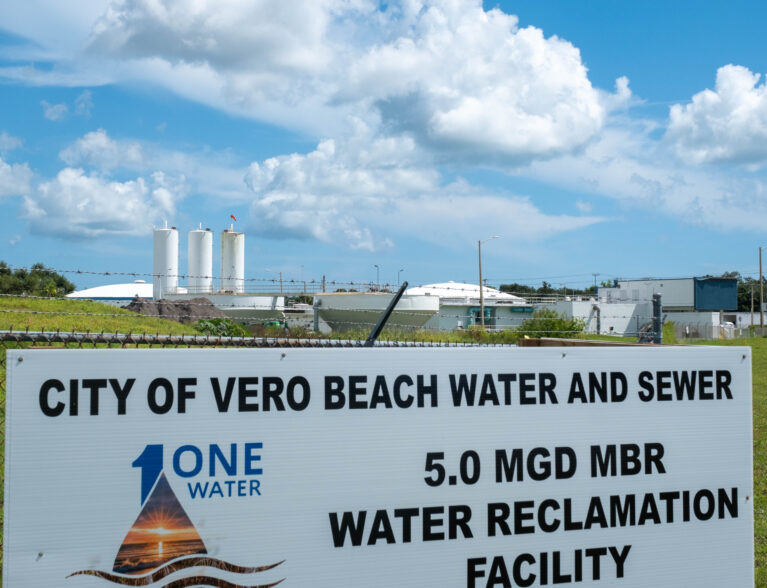
Should property tax reforms sweep across Florida next year and city governments scramble to replace lost revenue, Indian River Shores is worried Vero Beach will impose punishing surcharges and higher rates on water-sewer customers outside the city limits to further pad its general fund.
Vero Beach Utilities serves water-sewer customers in Indian River Shores and the unincorporated part of South Beach. Rates for all customers have recently spiked to fund system upgrades and construction of the city’s $164 million wastewater treatment plant at the airport. More rate hikes are expected next year.
State statute permits municipal-owned utilities to add surcharges to the bills of customers who reside outside the city limits, and recent legislative efforts to provide relief to outside customers have either failed, or been drafted too narrowly to have statewide impact.
This week the Shores sent letters to Tallahassee leaders urging state officials to preempt municipal utilities from shifting their tax burdens onto outside utility customers.
Shores Mayor Brian Foley said the move was prompted by briefings he attended on potential changes to Florida’s tax strategy, which could include expansion of homestead exemptions or other property tax reforms.
“I am going to parrot the words of some of the legislators that have had some concern about this proposed ad valorem tax reform, that it could turn into a shell game where we are paying higher rates for one thing, but we are getting relief in property taxes,” Foley said, adding that many outside customers face the same uncertainty.
“We will be asking for the governor and the legislature – I know it is a tall order to ask them to work together – but we are going to ask them to work together and also volunteer our experience in terms of crafting legislation that provides some resolution statewide for this problem. And it is not just us. There are a number of municipalities that are facing this,” Foley said.
Shores Vice Mayor Bob Auwaerter laid out an example of how surcharges could divide the community.
“Imagine a situation where you live on a block where a municipal government line border ran down between your house and your next-door neighbor’s house. Would you tolerate allowing an investor-owned utility, say like Florida Power & Light, to charge you 10 percent more than your neighbor? Of course you wouldn’t. But this is the nonsense we have to deal with on the municipal side,” Auwaerter said. “So to your point, it is completely intolerable.”
Sandpointe resident Doug DeMuth, who keeps up with legislation impacting the unincorporated part of South Beach and shares news with a loose coalition of South Beach HOAs, said he appreciates the Town of Indian River Shores’ efforts to advocate for utility ratepayers who live outside the Vero city limits.
The Indian River County Commission tied South Beach to Vero’s utility system for decades by renewing the county’s water-sewer franchise agreement with Vero in 2023, but it secured no rate guarantees in that deal.
DeMuth said Vero pledged to charge all customers the same under its One Water plan, but realistically, rates are set on an ad hoc basis by whatever revolving set of council members are in power at given time – council members unincorporated county residents don’t get to vote in or out of office.
“Indian River Shores has done a great job of turning over every possible rock to try to keep the outside utility customers from being taken advantage of,” DeMuth said.
House Bill 11 attempted to settle one South Florida municipal utility dispute involving outside customers this year, but Gov. Ron DeSantis vetoed it, urging the legislature to help outside customers statewide instead.
Municipal-owned utilities are not required to justify rate hikes before the Florida Public Service Commission, leaving no recourse for outside customers.
Indian River Shores has a franchise agreement regulating utility rates, but a series of breach of contract lawsuits has proven that document worthless when subjected to scrutiny in court. The circuit and appellate courts both ruled that state statute superseded the franchise terms, allowing Vero to both cover its costs plus a reasonable rate of return as owner of the utility.
For decades Vero charged outside electric, water and sewer customers a 10 percent surcharge.
The city council ended the practice in 2011 amid an outcry over soaring rates, and calls to get Vero out of the utility business altogether.
At one time, Vero transferred roughly $7 million per year from its electric utility and $4 million per year from its water-sewer utility into its general fund. The city still transfers $1.8 million from water-sewer revenues to the general fund.
Calls to sell off the Vero water-sewer utility or to consolidate it with Indian River County Utilities to reduce rates have subsided somewhat over the years, but in 2019, Vero sold its electric utility to investor-owned Florida Power & Light for $185 million, much of which went to extricate Vero from long-term power contracts.
The city got nearly $40 million in cash, plus annual property tax and franchise fees on electric bills, and the community got low FP&L rates.
Photos by Joshua Kodis





